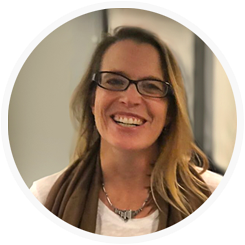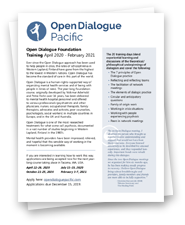Open Dialogue Training
Two-Year Family Psychotherapy Advanced Training
Dialogical Approaches in Couple and Family Therapy
Psychotherapy trainers training 2022–2024
Organizers: Open Dialogue Pacific, Dialogical Therapy, with ancillary support from University of Washington faculty member Fletcher B. Taylor, MD.
Tacoma, WA
Includes: Supervision, Family of Origin work, Theory & Practicum - Cost $10,975
August 15-19, 2022
October 17-21, 2022
January 16-20, 2023
May 1-5, 2023
Summer 2023 (exact date TBD)
Fall 2023 (exact date TBD)
Winter 2023-24 (exact date TBD)
Spring 2024 (exact date TBD)
The aim is to develop dialogical practices in family therapy. The participants will be qualified to act as responsible trainers in education programs for psychotherapists. The emphasis will be on developing practices that mobilize in a collaborative way the resources of clients and professionals. The specific aims are:
1) to further develop the dialogical psychotherapeutic skills of the participants,
2) to develop the skills for acting as supervisor, trainer and consultant, and
3) to enhance skills for developing social and health care towards more democratic and human practices.
This program will follow the criteria of Finnish legislation, and the official title for the training is therefore “Psychotherapy Trainers’ Training – Dialogical approaches for couples and family therapy”. This is because Open Dialogue training in Finland (named as Advanced Family Therapy Training) follows these criteria. The aim is that during the training the participants will be supported to start their own programs of Open Dialogue and Dialogical Practice.
Participants will gain personal tools for generating dialogical and reflective processes in challenging client and supervision situations. The focus will also be on developing dialogical ways for collaboration within clients’ social networks – including both the private and the professional parts of the networks.
The training program provides a full learning process that prepares for taking charge of training and supervision in family therapy. The special aim is to increase competence to conduct education programs in dialogical practices - as Open Dialogue - for the most severe mental health crises.
Criteria to become trainee: The candidate should have family therapy training or equivalent psychotherapy training plus documented working experience of dialogical family and network practices. The criteria must meet or be equivalent to a minimum of 60 ECTS training in psychotherapy. In all, 18 participants will be selected for the training program through an admission interview.
The volume and content of the training:
The training includes altogether 40 training days in the course of two study years (4 terms). The entire volume of the training is 40 ECTS.
The content will be covered in eight (8) five-day seminar blocks (8 x 5 days) which each time include eight theory seminars (duration two or three days each). Each block of the training includes either supervision or Family of Origin seminars. The format is planned to minimize the expenses and inconveniences of trainees traveling long distances.
Theory, 152 hours - 27 ECT The theory program will take place mainly in sets of two or three seminar days included in the eight five-day training blocks. Each seminar will have a specific topic focusing on collaborative dialogical skills and specific subjects of dialogical practice. For example: treatment of psychosis, origins of social network orientation both in private and professional networks, children and adolescents as specific clients, dialogical skills in supervision and organization consultation, research in family therapy and social networks practices.
Each participant will conduct their own research of relevant topic within their working context and write a thesis report (10 ECT). For preparing the thesis two seminar days will be conducted and in addition in seven theory seminar block two hours will be focused on the guidance of the process of preparing thesis (16 +14 h).
Supervision 96 hours - 10 ECT Supervision will take place in three small groups during the training program. Video recordings of the participants’ family therapy practice will be the main data in the supervision. As far as the international participation and long distances allow, also live supervision will be supported. Participants will act as supervisors to each other during the later phase of the training - thus improving supervision skills. As a part of the supervision participants will take an examination in which they describe one psychotherapy process thus presenting their maturity in using dialogical orientation in psychotherapy work with families and social networks. In order to pass examination the participants will describe the content of the specific contact, the methods of approach fitting to this specific case and critically analyse their own clinical work.
Family of Origin seminars, 72 hours - 3 ECT Family of Origin seminars are the form of the participants’ own psychotherapy specific to this training. They will be conducted in three small groups working together during the entire program. Specific approach will be conducted together with the therapists.
There will be some 3000 pages of relevant literature for outside reading required.
Participants have to conduct psychotherapeutic work – preferably family therapy - altogether 300 x 45 minutes, all of this documented.
To support their learning process, participants will be divided in peer groups, in which they study literature, prepare seminar work, prepare their own teaching practice, participate in each other’s’ clinical work and support joint learning in other ways.
The trainees will cover their own travel expenses and lodging as well as purchase the literature.
To be admitted, the applicant has to pass the admission interview. The dead line for written applications is December 1, 2020. The application should be submitted by email. In the application the following aspects shall be clarified and should comprise about 1-2 pages of written text.
• Contact information of the applicant (name, title, mail address, email, telephone)• The education, profession, working place of the applicant;
• Description of how psychotherapy and family therapy (or related topics of work) is carried out in the daily work of the candidate;
• All the psychotherapy training that the candidate has;
• The amount of received supervision and potential own psychotherapy;
• Description of motivations for and the meaning of the Trainers training for the candidate. Of special interest are descriptions of the ways in which dialogical practice is important to the candidate concerning developing social and health care and in which ways the candidate is motivated to act as supervisor and trainer and description of the current, relevant, life situation of the applicant.
The application should be submitted on the website here opendialoguepacific.com. The deadline for the application is December 1, 2020. All the candidates that pass the criteria for potential trainees will be sent options for interview slots and should complete a phone interview individually before December 15, 2020. The information of acceptance will be sent to the participants before January 1, 2021.
Inter-vision/Supervision Sessions:
Alita Kathryn Taylor, MA, LMFT facilitates group supervision monthly in her Seattle office. These sessions are open to those wanting to improve their dialogical skills. Space is limited. Sign up here:
Download our latest flyer about Open Dialogue and Training.

Alita Kathryn Taylor, MA, LMFT
Alita is the first person in the U.S. to complete the advanced family therapy training in 2016 in Finland to psychiatrists, psychologists, social workers, and psychotherapists internationally. Many studies show that there, schizophrenia rates went from the highest to the lowest in the western world. The philosophical underpinnings of this approach are that in dialogue, new meanings and new understandings of a crisis can be formed, and as we are discovering from neuroscience, relationship is indeed medicine.
Receive info about Open Dialogue Pacific
Add your contact info here to receive Open Dialogue Pacific news:
MORE ABOUT OPEN DIALOGUE TRAINING:
Open dialogue training has its roots in Tornio, Finland. At Keropudas Hospital, since 1989, family psychotherapy training for all staff consisted of seminars in family systems theory, family of origin seminar days in a cohort-based group, and supervision, in the form of a cohort-based group. In open dialogue training there is a consistent attitude of learning, a team-approach, and a dialogic curiosity of simply doing the work together. Practicing and discussing together what works and what doesn’t, responding to the changing needs of clients and their networks, using shared decision-making and psychological continuity, were all parts of the open dialogue training given to all psychiatrists, nurses, social workers, psychologists, and counselors working there in Western Lapland. This interdisciplinary approach helped integrate treatment for those in crisis. Teams for families in crisis consisted of varied license types, and each team of 2-3 staff were in the treatment meetings (always with clients and network members present, honoring “nothing about you without you”) together.
Open dialogue training is important for any mental health service system to learn together what works in their local contexts. The open dialogue training curriculum is not manualized, having said that, the structure of open dialogue training is cohort-based with blocks of theory, supervision, and family of origin work. In other words, how open dialogue training is given is imperative to a staff’s success in providing services dialogically, meaning including all the voices. Open dialogue training should be intertwined with local resources within and between staff members, and within and between families and social networks.
Polyphony, or dialogism, maintains that an ever-changing and growing acquisition and integration of knowledge requires collaboration, tolerance of uncertainty, and resourcing beyond professional expertise. Open dialogue training maintains psychological continuity between its team members, just as its treatment does. Cohort-based open dialogue training encourages learn-by-doing, and possibilities of use are infinite. A process of understanding of intersubjectivity and applying interpersonal neurobiology and social constructionism are hallmarks of open dialogue training.
Contact us at www.opendialoguepacific.com/contact to learn more about providing open dialogue training in your organization.

